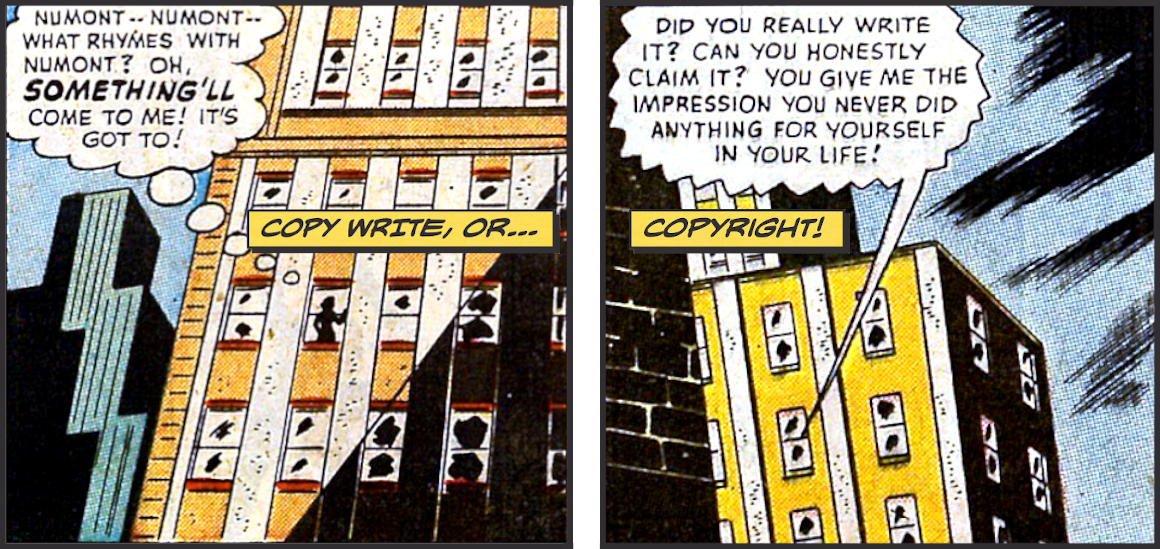Checking my website statistics, I have been amazed recently at the number of visitors who come to the site mistakenly believing it contains discussions on copyright law.
Google searches such as ‘How to copy write a movie’ and ‘The law behind copy write’ persuade me that there is some confusion between copyright and copy write. On clicking back through to one of these Google searches I was even more amazed to find a high number of forum posts, web articles and more that talk about “copy write infringement”, “the difference between copywrite and trademarks” and other similarly misguided missives.
Etymology and Origins
Although this may seem a minor grievance to some, the major difference between the two concepts can promote confusion. For example, when someone says they are copywriting a document, do they mean producing the words that form the document or do they mean protecting their legal right as the author?
Both ‘copy write’ and ‘copyright’ take the root ‘copy’ to refer to the words that form the product. Copy derives from the Medieval Latin copia meaning ‘reproduction or transcript’. This should not be confused with the Classical Latin copia (‘plenty’) from which we derive the word ‘copious’. This is how the word ‘copy’ developed the dual meanings of duplication as well as a written transcript intended for print.
Understanding ‘Copyright’
‘Copyright’, first coined in 1735, refers to the legal recognition in the authorship of a piece of work. It is an automatic right — you don’t need to register copyright with anyone for it to be legally binding. You don’t even need to include the copyright emblem or any information for copyright to apply.
But, the power of the copyright is dependent on your ability to prove authorship should it be contested. Also, the chronology between your script and the offending article needs to be plain – which one came first. Finally, proof of access is required. This means you need to show that the offending writer was exposed to your work or ideas for them to copy or be influenced. If it turns out that mere coincidence is in play, you may not have a case for copyright infringement.
This is why some people prefer to register their scripts with appropriate bodies. These include the various industry Guilds who usually offer a registration service. By registering a script, there can be no debate over the authorship or dates of a script should another script surface that seems to plagiarise your hard work.
Understanding ‘Copy Write’
If you want to talk about your ability to ‘copy write’ something, you are referring to the task of writing the document. Note that ‘copy write’ is two words and not a single form ‘copywrite’. ‘Copy write’ is a minor tautology, which is why there is no single word form. It is enough to say you will write an article rather than say you will copy write it.
Despite this, there are single words such as copywriter, copywriting, and so on, that refer to the person completing the task or the act of producing copy.
So why not simply use the word ‘writer’?
The term ‘writer’ covers all aspects of writing, but copywriting is a specific discipline. In much the same way as a scriptwriter describes a writer of scripts, a copywriter describes someone able to produce the specific and unique properties of commercial copy.
Copywriting is about producing brief, effective and evocative text designed for a specific purpose. Most commonly used in the advertising, journalistic and marketing fields, copywriting produces words to fit a number of criteria other than the purely creative. Tight word counts, the space on the page, complimenting the accompanying imagery, inducing a specific action in the reader – each of these are just as important as the creativity in copywriting.
Whereas a novelist or even a scriptwriter may write long, winding sentences of verbose and florid language, a copywriter will spend hours sweating over how to cut most of those words out. A copywriter’s dream is to cut a long-winded sentence down to one evocative word that gets the same message across.
Copyrighting Copy Writing!
Of course, all copywriting is copyrighted. And sometimes the details of a copyright agreement will need to be copy written. But to confuse the two concepts can cause some frustrating misunderstandings.
If you are interested in copywriting, check out the wonderful CopyBlogger, with daily articles on the most effective uses of words and language. For further advice on copyright issues, you can visit The US Copyright Office in the United States, The Intellectual Property Office in the UK, and in Australia, The Copyright Council’s Online Information Centre.
